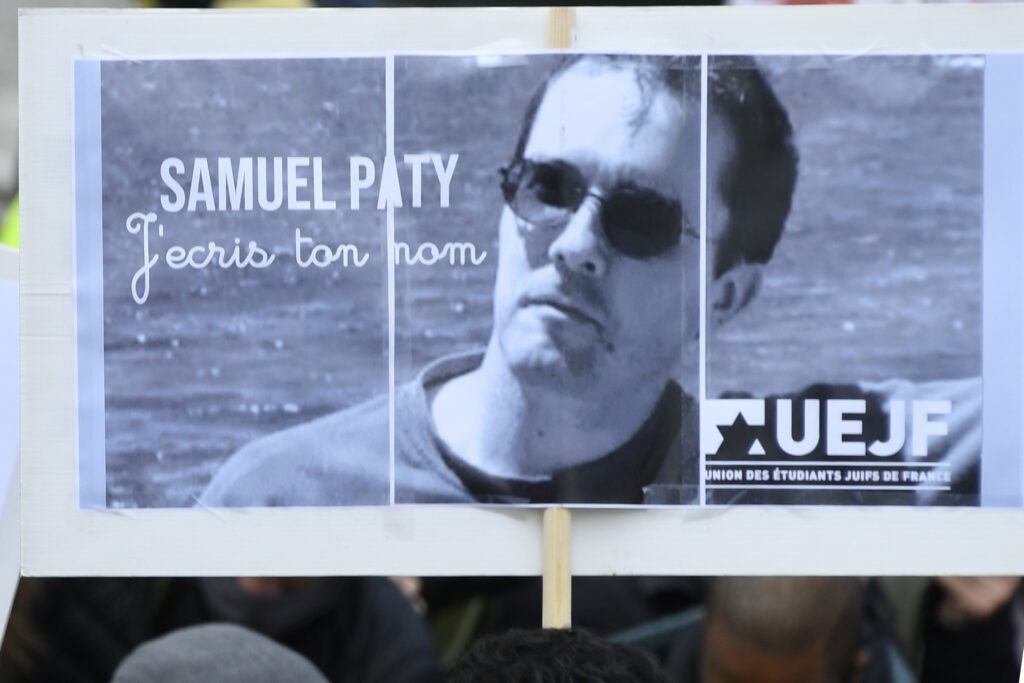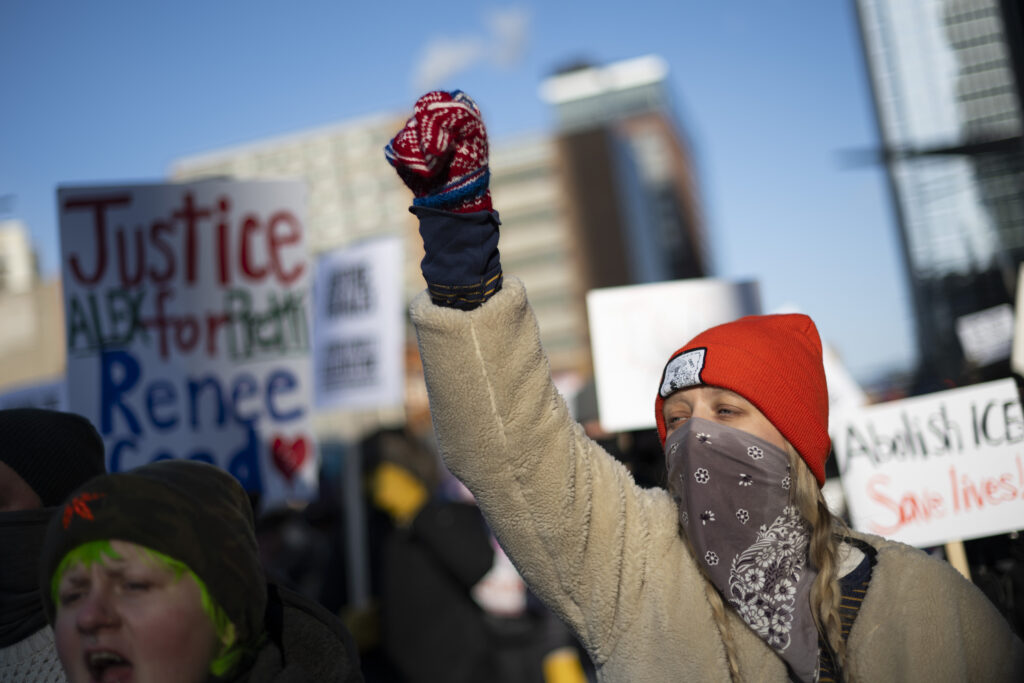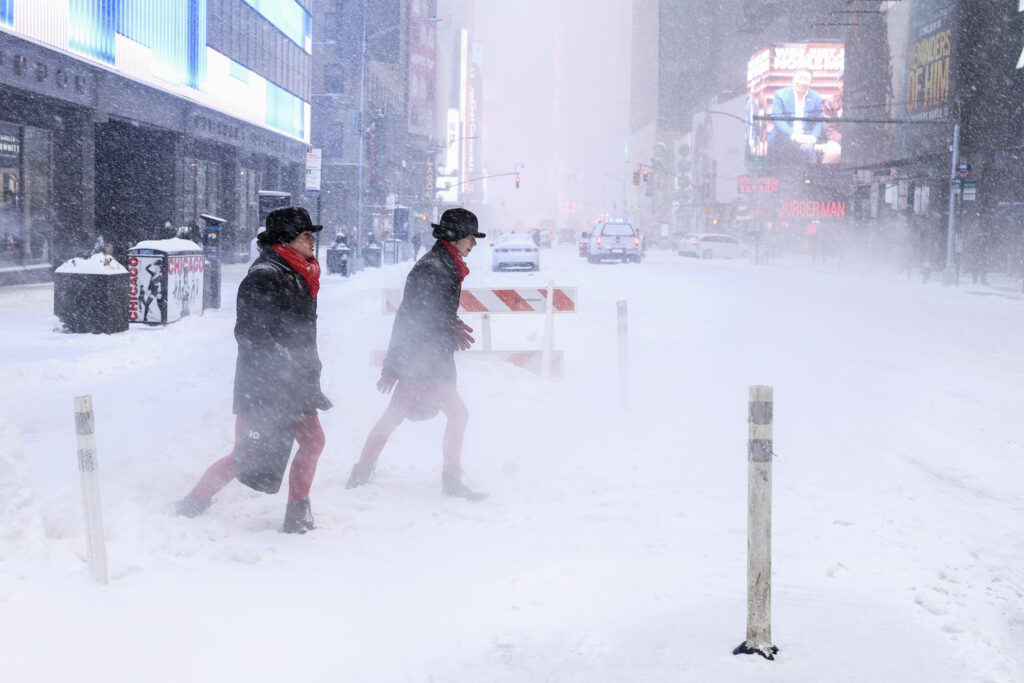Appeal trial over 2020 teacher’s beheading opens in France
An appeal trial opened in Paris on Monday for four men convicted over the 2020 jihadist beheading of schoolteacher Samuel Paty, a killing that horrified France.Paty, 47, was murdered in October 2020 by an 18-year-old Islamist radical of Chechen origin after showing cartoons of the Prophet Mohammed in class.His attacker, Abdoullakh Anzorov, was killed in a shootout with police.In December 2024, seven men and one woman were found guilty of contributing to the climate of hatred that led to the beheading of the history and geography teacher in Conflans-Sainte-Honorine, west of Paris.Four of the men have appealed against sentences ranging from 13 to 16 years in prison.Two friends of Anzorov, Naim Boudaoud and Azim Epsirkhanov, have appealed against convictions for complicity in the killing, for which they were sentenced to 16 years in prison.At the first trial, prosecutors accused them of giving Anzorov logistical support, including to buy weapons.Two other defendants, convicted of “terrorist” criminal association for their role in the hate campaign against Paty ahead of his murder, have also appealed against their sentences.Brahim Chnina, the Moroccan father of a schoolgirl who falsely claimed that Paty had asked Muslim students to leave his classroom before showing the caricatures, was sentenced to 13 years.His daughter, then aged 13, was not actually in the classroom at the time and in the first trial apologised to her former teacher’s family.Abdelhakim Sefrioui, a Franco-Moroccan Islamist activist, was jailed for 15 years.- Freedom of expression laws -Prosecutors alleged during the first trial that Chnina and Sefrioui spread the teenager’s false claims on social media to provoke a “feeling of hatred”.But Chnina’s lawyers said their client’s role would be “put into perspective” during the appeal trial, adding that he “never participated in terrorist activity”.A lawyer for Sefrioui said there was “nothing linking” his client to Anzorov’s crimes.The remaining four defendants, described as part of a network of jihadist sympathisers around Anzorov who spread inflammatory content online, did not appeal against their convictions, which included prison or suspended terms. The trial at the Special Assize Court of Appeal in Paris is set to last until February 27.Paty, who has become a free-speech icon, had used the cartoons as part of an ethics class to discuss freedom of expression laws in France.They were first published in the satirical Charlie Hebdo magazine in 2015.Blasphemy is legal in a nation that prides itself on its secular values and there is a long history of cartoons mocking religious figures.Paty’s killing took place just weeks after Charlie Hebdo republished the cartoons.After the magazine first published them, Islamist gunmen stormed its offices, killing 12 people.
Le milliardaire tchèque Daniel Kretinsky veut prendre la majorité de Fnac Darty
Le milliardaire tchèque Daniel Kretinsky va lancer une offre publique d’achat (OPA) sur Fnac Darty et compte ainsi prendre le contrôle majoritaire du spécialiste de l’électronique et des produits culturels sur qui planait l’ombre d’un actionnaire indirect chinois ces derniers mois. Pour ce faire, la société EP Group, contrôlée par le Tchèque, a transmis vendredi au conseil d’administration de Fnac Darty une offre proposant un prix de 36 euros par action, valorisant l’entreprise à plus d’un milliard d’euros, selon un communiqué publié lundi. “Le conseil d’administration de Fnac Darty a unanimement accueilli favorablement l’offre”, fait savoir Fnac Darty, dont Daniel Kretinsky est déjà le principal actionnaire, à hauteur de 28,5%. Avec cette OPA, il compte franchir le seuil de 50% du capital.- Pas de sortie de la Bourse -A l’ouverture de la Bourse de Paris, l’action Fnac Darty a bondi de près de 19%. Vers 11H50, elle grimpait de 17,02%, à 35,40 euros. Vendredi, le titre avait terminé la semaine à 30,25 euros. Le prix proposé représente une plus-value d’environ 25% sur le cours de Bourse moyen de l’action Fnac Darty ces derniers mois.A 36 euros l’action, le montant total de l’investissement nécessaire à Daniel Kretinsky pour atteindre le seuil des 50% du capital est de presque 230 millions d’euros. L’offre, dont le dépôt auprès de l’Autorité des marchés financiers (AMF) est prévu “avant la fin du premier trimestre 2026”, n’entraînera pas de sortie de la Bourse, puisqu’EP Group n’a “pas l’intention de mettre en oeuvre une procédure de retrait obligataire”, est-il précisé. “Nous saluons ce projet de notre premier actionnaire, qui témoigne d’un soutien renouvelé à notre plan Beyond everyday et à notre stratégie de plus long terme”, a réagi le directeur général de Fnac Darty, Enrique Martinez, cité dans le communiqué. En devenant l’actionnaire majoritaire de Fnac-Darty, Daniel Kretinsky empêcherait de facto le chinois de l’e-commerce JD.com d’acquérir davantage de poids dans les décisions de l’entreprise, qui a récemment fait l’objet d’une attention particulière du ministère français de l’Économie concernant son contrôle et ses actionnaires. JD.com est en train d’acquérir le distributeur allemand Ceconomy qui détient plus de 20% du capital de Fnac Darty lui conférant de manière indirecte la place de deuxième actionnaire de l’entreprise française. Un changement de main qui a poussé le ministère de l’Economie à poser quelques conditions au cours de l’automne, parmi lesquelles, outre la non intervention dans la gestion, un engagement de JD et Ceconomy à ne pas augmenter leur participation au capital de Fnac Darty. Des conditions que JD.com a acceptées fin novembre. “L’Etat suivra de près ce dossier”, a assuré lundi Bercy à l’AFP. A 11H00, ni Ceconomy, ni JD.com n’avaient réagi à l’annonce de Fnac Darty.”Les approches pour démarrer les démarches administratives vont démarrer dans les prochaines heures”, a indiqué Enrique Martinez lors d’un point presse.La clôture de l’offre sera soumise aux autorisations des autorités de la concurrence française et suisse, ainsi qu’à celle de la Commission européenne. – Vente de Nature & Découvertes -Simultanément à l’annonce de l’OPA, Fnac Darty a annoncé qu’il cherchait à se séparer de Nature & Découvertes, enseigne dédiée au bien-être qu’il avait acquise en 2019 et dont les difficultés plombaient les comptes du groupe. “Le groupe a décidé de lancer un processus actif de recherche de partenaire qui serait plus à même de soutenir son développement”, ajoute Fnac Darty dans son communiqué, précisant reclasser l’enseigne en “IFRS 5”, soit les actifs destinées à la vente. Les résultats préliminaires du groupe pour 2025, non audités, laissent entrevoir un chiffre d’affaires quasi stable (+0,7%) à 10,3 milliards d’euros à périmètre, à taux de change et parc de magasins constants, et un résultat opérationnel courant “en légère progression” à 203 millions d’euros.L’activité devrait aussi être restée “stable” en organique au quatrième trimestre, indique Fnac Darty, mais les trois derniers mois de l’année ont été pénalisés par “la contre performance de la France” (près de 60% de l’activité du groupe), qui a enregistré une baisse de 0,6% de son activité sur un an.Le groupe avait fait part en juillet d’une perte nette de 86 millions d’euros au premier semestre 2025, légèrement réduite sur un an, sans donner d’objectif pour son résultat net d’ici la fin de l’année.
Appels croissants à une enquête indépendante sur les événements de Minneapolis
Donald Trump faisait face lundi à des appels croissants, y compris de son propre camp, en faveur d’une enquête indépendante sur l’homicide d’un deuxième citoyen américain, tué par la police fédérale de l’immigration à Minneapolis.”Nous examinons la situation, nous passons tout en revue et nous rendrons une décision”, a déclaré le président Donald Trump dans une brève interview téléphonique dimanche soir avec le Wall Street Journal.”Je n’aime pas les tirs. Je n’aime pas ça”, a-t-il ajouté, plus prudent que plusieurs membres de son équipe depuis deux jours. “Mais je n’aime pas non plus quand quelqu’un se rend à une manifestation avec une arme très puissante, entièrement chargée, et deux chargeurs remplis de balles en plus”.Alex Pretti, un infirmier américain de 37 ans employé en service de réanimation dans un hôpital pour anciens combattants, a été tué par balles samedi lors d’une manifestation contre des opérations de la police de l’immigration (ICE).Et les vidéos disponibles semblent démentir la version de l’administration, dans une atmosphère déjà tendue à l’extrême depuis la mort de Renee Good, une Américaine tuée par balle le 7 janvier dans la même ville par un agent de l’ICE.Selon le Washington Post, deux audiences sont prévues lundi devant un tribunal du Minnesota. Une plainte vise à empêcher les autorités fédérales de détruire des preuves de l’incident. Dans la seconde, le procureur général de l’État demande la fin du déploiement d’agents fédéraux de l’immigration dans l’État.Sur ce dernier point, Donald Trump a sous-entendu que les forces fédérales quitteraient Minneapolis “à un moment donné”. Mais il n’a donné aucune date et loué leur “travail phénoménal”.Les déclarations des hauts responsables américains ont été vivement critiquées par les démocrates, mais aussi par des sénateurs républicains. Et les ex-présidents démocrates Bill Clinton et Barack Obama ont appelé les Américains à défendre leurs valeurs.”Il appartient à tous ceux d’entre nous qui croient en la promesse de la démocratie américaine de se lever, de s’exprimer”, a déclaré Bill Clinton, estimant que l’administration Trump avait “menti” sur ces deux décès.- “Sursaut” -Barack Obama a pour sa part appelé à un “sursaut” alors que les valeurs américaines sont “attaquées”.Donald Trump, lui, a imputé ces deux morts aux élus démocrates de la ville et de l’État, les rendant responsables “de ce chaos” sur sa plateforme Truth Social.Minneapolis est secouée depuis plusieurs semaines par un mouvement de protestation contre la présence de l’ICE.Dans le centre de cette ville d’un peu plus de 400.000 habitants, près d’un millier de personnes se sont rassemblées dimanche en hommage à Alex Pretti et contre les actions des forces de l’ordre fédérales malgré un froid glacial, selon un photographe de l’AFP.”Je suis triste et en colère”, a déclaré Lucy, une habitante de Minneapolis rencontrée par l’AFP. “Mais je n’ai pas peur d’être là et je n’ai pas peur de continuer le combat et de défendre ce qui est juste”.- “Mensonges écoeurants” -Comme il l’avait fait après la mort de Renee Good, le gouvernement Trump a rejeté la faute sur la victime, la ministre de la Sécurité intérieure Kristi Noem l’accusant notamment de “terrorisme”.Une analyse par l’AFP de plusieurs vidéos de l’événement semble pourtant contredire cette version. Les images montrent Alex Pretti, téléphone en main dans une rue enneigée, filmant des hommes armés portant des gilets siglés “Police”.Il s’interpose lorsqu’un agent projette une manifestante au sol sur le trottoir et reçoit un jet de gaz lacrymogène au visage. Un agent le plaque ensuite à terre, et plusieurs de ses collègues interviennent pour le menotter.Quelques secondes plus tard, alors qu’un agent vêtu de gris semble retirer une arme au niveau de la taille d’Alex Pretti, agenouillé et penché en avant avec plusieurs policiers au-dessus de lui, un coup de feu est tiré.Les agents s’écartent brusquement et tirent alors plusieurs fois à distance sur son corps inanimé. Au moins dix coups de feu sont entendus.Dans un communiqué, les parents d’Alex Pretti ont accusé l’administration Trump de répandre “des mensonges écœurants” sur leur fils, “un être au grand cœur”.Les dirigeants de 60 entreprises basées dans le Minnesota ont signé une lettre ouverte “appelant à une désescalade immédiate des tensions et à la collaboration des autorités locales, régionales et fédérales pour trouver des solutions concrètes”.
Extrême droite: la justice sonne la fin de la dynastie Bompard à Orange
La justice a sonné la fin de la dynastie des Bompard à Orange, dans le Vaucluse, en condamnant lundi le fils, Yann Bompard, maire de la ville depuis 2021, à cinq ans d’inéligibilité, une décision qui s’applique immédiatement et le contraint à démissionner.Yann Bompard, jugé à Marseille pour avoir occupé un emploi fictif de collaborateur parlementaire, devra aussi démissionner de son mandat de conseiller départemental. Il avait succédé à son père, Jacques Bompard, maire de cette ville de 30.000 habitants depuis 1995, quand celui-ci avait été condamné pour prise illégale d’intérêt.L’élu n’était pas présent à l’annonce du jugement lundi matin. Sollicités par l’AFP après l’audience, ses avocats n’ont pas souhaité faire de commentaire.La députée RN Marie-France Lorho, elle aussi prévenue dans cette affaire comme employeuse de Yann Bompard, est elle venue à la barre. Le tribunal correctionnel de Marseille l’a également condamnée à cinq ans d’inéligibilité avec exécution provisoire. Tous deux sont aussi condamnés à 18 mois de prison avec sursis.Expliquant la décision d’exécution provisoire, la présidente du tribunal a estimé que les deux prévenus n’étaient “pas aptes à exercer (leurs) fonctions et ce dès aujourd’hui”.L’avocat de Mme Lorho, Guillaume de Palma, a indiqué à l’AFP qu’elle resterait députée “jusqu’à la fin de son mandat actuel”, comme le prévoit la jurisprudence et que sa cliente n’avait pas encore décidé d’un éventuel appel.Marie-France Lorho était devenue députée sous l’étiquette Ligue du Sud, petit parti créé par Jacques Bompard, quand celui-ci avait laissé sa place pour cause de cumul des mandats en 2017.C’est à la fin de ce premier mandat qu’elle avait engagé Yann Bompard comme collaborateur, avant d’être reconduite en 2022 puis en 2024, cette fois sous l’étiquette RN.- “Facteur aggravant” -La justice lui reproche de ne pas avoir mis fin à ce contrat de travail alors que M. Bompard ne l’effectuait plus après avoir succédé à son père Jacques à la tête de la mairie d’Orange, fin 2021.La présidente du tribunal a fait remarquer que Yann Bompard n’utilisait plus les moyens mis à sa disposition pour faire son travail de collaborateur parlementaire, “son bureau, son adresse mail”.Les multiples casquettes du fils Bompard, conseiller départemental, président d’intercommunalité, collaborateur parlementaire puis, surtout, maire d’Orange, faisaient que “matériellement (…) il manquait de temps pour remplir ses obligations contractuelles” dont “la grande majorité (…) n’était pas effectuée”, avait pointé la procureure lors de l’audience, en réclamant cette peine d’inéligibilité avec application immédiate.”Alors qu’elle disposait des moyens de mettre fin à l’infraction, Marie-France Lorho a persisté à employer et à rémunérer Yann Bompard, et ce pendant plus d’une année”, a relevé le tribunal dans ses motivations.Le tribunal a aussi estimé que les justifications de Mme Lorho, qui a fait part de craintes des réactions de la famille Bompard si elle mettait fin à leur collaboration, est un “facteur aggravant. “Marie-France Lorho a choisi de se positionner puis de se maintenir sous la coupe d’un responsable politique local. Elle a choisi de favoriser les intérêts financiers de la famille de ce dernier” et “de préserver son propre avenir politique au détriment du bien public”.Elle a également été condamnée à une amende de 10.000 euros. Jacques Bompard, lui, accusé de s’être enrichi personnellement en percevant un salaire indu, est condamné à une amende de 40.000 euros. Ils doivent aussi, solidairement, rembourser près de 75.000 euros à l’Assemblée nationale, partie civile.
Une panne perturbe partiellement le trafic du tunnel sous la Manche
Les trains transportant des voitures et du fret sous la Manche ont été “suspendus” lundi matin au départ de la France en raison d’un “défaut d’alimentation électrique”, a indiqué Eurotunnel à l’AFP, prévoyant un retour à la normale dans la journée.Cette panne n’affecte pas les trains Eurostar transportant des voyageurs, ni les trains de fret et voitures depuis le Royaume-Uni vers la France, précise la société qui exploite le tunnel reliant les deux pays.Ce sont les navettes “Shuttle”, permettant le transport de voitures et de leurs passagers sur des trains et “Shuttle Fret”, pour le transport de camions de marchandises, qui sont concernées depuis l’aube.Cette panne électrique, qui n’affecte pas le tunnel lui-même mais le terminal ferroviaire de Coquelles (Pas-de-Calais) ralentit “l’enregistrement des passagers” de ces deux services et “leur passage aux postes de frontières”, précise encore l’entreprise.Eurotunnel a précisé lundi matin que “le retour à la normale” pour l’accueil des clients du transport de marchandises était prévu “pour 13H00” lundi, et celui des passagers qui empruntent les navettes transportant des véhicules devrait “reprendre dans le courant d’après-midi”.
Une tempête hivernale majeure fait au moins 11 morts aux Etats-Unis
Un froid polaire persistait lundi sur une large partie des Etats-Unis où une tempête hivernale majeure a causé la mort d’au moins onze personnes, privant également plus d’un million de foyers d’électricité et clouant au sol des milliers d’avions.Les autorités ont averti qu’une masse d’air arctique allait faire chuter les températures à des niveaux dangereusement bas pendant encore plusieurs jours.L’état d’urgence a été déclaré dans une vingtaine d’Etats ainsi que dans la capitale fédérale, Washington. Considérée par certains météorologues comme l’un des pires épisodes hivernaux de ces dernières décennies aux Etats-Unis, la tempête s’accompagne de températures glaciales, d’importantes chutes de neige et d’accumulations de glace aux conséquences potentiellement “catastrophiques”, selon le service météo national (NWS).Le maire de New York, Zohran Mamdani, a déclaré que cinq personnes avaient été retrouvées mortes à l’extérieur au cours du week-end dans des températures glaciales.”Alors que nous ne connaissons pas encore les causes de leur décès, rien ne rappelle plus fortement le danger du froid extrême et la vulnérabilité de nombreux habitants, en particulier des New-Yorkais sans abri”, a-t-il déclaré lors d’une conférence de presse dimanche.Au Texas, les autorités ont confirmé trois décès, dont celui d’une adolescente de 16 ans tuée dans un accident de luge. Deux personnes sont mortes d’hypothermie en Louisiane.Par ailleurs, une personne a été tuée et deux autres blessées samedi lors d’une collision liée aux conditions hivernales dans le sud-est de l’Iowa, selon la police d’État locale.Quelque 820.000 clients étaient toujours sans électricité lundi matin, principalement dans le Sud des États-Unis, selon le site spécialisé PowerOutage.com.Au Tennessee, où la glace a fait tomber des lignes électriques, plus de 250.000 clients restaient sans électricité lundi, tandis que 100.000 clients étaient privés de courant en Louisiane et dans le Mississippi.Les autorités, du Texas à la Caroline du Nord et à New York, ont exhorté les habitants à rester chez eux en raison des conditions périlleuses.”Évitez de prendre la route sauf en cas d’absolue nécessité”, a publié la Division de gestion des urgences du Texas sur X.- Vortex polaire -La tempête se déplaçait dimanche vers le nord-est, déversant de la neige sur les grandes villes densément peuplées dont Philadelphie, New York et Boston. “Nous continuerons à surveiller et à rester en contact avec tous les Etats qui se trouvent sur le trajet de cette tempête. Restez en sécurité et restez au chaud!”, a demandé le président américain Donald Trump sur sa plateforme Truth Social.Plusieurs grands aéroports de la capitale Washington, de Philadelphie ou de New York étaient quasiment à l’arrêt, alors que plus de 19.000 vols à destination et en provenance des Etats-Unis ont été annulés depuis samedi et que des milliers d’autres ont été retardés, selon le site FlightAware.La FAA, l’autorité américaine de régulation de l’aviation, a indiqué sur son compte X qu’un petit avion transportant huit personnes s’était écrasé dimanche soir lors de son décollage dans un aéroport du Maine (nord-est) sans préciser si les conditions météo étaient liées à cet accident.La tempête est liée à une déformation du vortex polaire, une masse d’air circulant habituellement au-dessus du pôle nord, mais qui s’est étirée vers le sud.Les scientifiques estiment que la fréquence croissante de ces perturbations du vortex pourrait être liée au changement climatique, bien que le débat ne soit pas tranché et que la variabilité naturelle joue également un rôle.Climatosceptique assumé, Donald Trump a toutefois pris prétexte de la tempête pour exprimer de nouveau son scepticisme sur sa plateforme Truth Social: “Est-ce que les insurgés environnementaux pourraient m’expliquer s’il vous plaît: QU’EST CE QUI EST ARRIVE AU RECHAUFFEMENT CLIMATIQUE?”.Les autorités ont mis en garde contre un froid potentiellement mortel pouvant durer une semaine après la tempête, notamment dans les Grandes Plaines du Nord et d’autres régions du centre, où les températures ressenties pourraient atteindre -45°C.De telles températures peuvent provoquer des engelures en quelques minutes.






